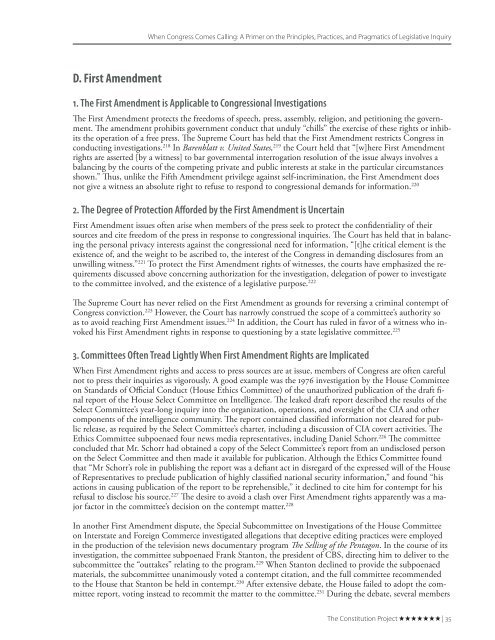When Congress Comes Calling
WhenCongressComesCalling
WhenCongressComesCalling
You also want an ePaper? Increase the reach of your titles
YUMPU automatically turns print PDFs into web optimized ePapers that Google loves.
<strong>When</strong> <strong>Congress</strong> <strong>Comes</strong> <strong>Calling</strong>: A Primer on the Principles, Practices, and Pragmatics of Legislative Inquiry<br />
D. First Amendment<br />
1. The First Amendment is Applicable to <strong>Congress</strong>ional Investigations<br />
The First Amendment protects the freedoms of speech, press, assembly, religion, and petitioning the government.<br />
The amendment prohibits government conduct that unduly “chills” the exercise of these rights or inhibits<br />
the operation of a free press. The Supreme Court has held that the First Amendment restricts <strong>Congress</strong> in<br />
conducting investigations. 218 In Barenblatt v. United States, 219 the Court held that “[w]here First Amendment<br />
rights are asserted [by a witness] to bar governmental interrogation resolution of the issue always involves a<br />
balancing by the courts of the competing private and public interests at stake in the particular circumstances<br />
shown.” Thus, unlike the Fifth Amendment privilege against self-incrimination, the First Amendment does<br />
not give a witness an absolute right to refuse to respond to congressional demands for information. 220<br />
2. The Degree of Protection Afforded by the First Amendment is Uncertain<br />
First Amendment issues often arise when members of the press seek to protect the confidentiality of their<br />
sources and cite freedom of the press in response to congressional inquiries. The Court has held that in balancing<br />
the personal privacy interests against the congressional need for information, “[t]he critical element is the<br />
existence of, and the weight to be ascribed to, the interest of the <strong>Congress</strong> in demanding disclosures from an<br />
unwilling witness.” 221 To protect the First Amendment rights of witnesses, the courts have emphasized the requirements<br />
discussed above concerning authorization for the investigation, delegation of power to investigate<br />
to the committee involved, and the existence of a legislative purpose. 222<br />
The Supreme Court has never relied on the First Amendment as grounds for reversing a criminal contempt of<br />
<strong>Congress</strong> conviction. 223 However, the Court has narrowly construed the scope of a committee’s authority so<br />
as to avoid reaching First Amendment issues. 224 In addition, the Court has ruled in favor of a witness who invoked<br />
his First Amendment rights in response to questioning by a state legislative committee. 225<br />
3. Committees Often Tread Lightly <strong>When</strong> First Amendment Rights are Implicated<br />
<strong>When</strong> First Amendment rights and access to press sources are at issue, members of <strong>Congress</strong> are often careful<br />
not to press their inquiries as vigorously. A good example was the 1976 investigation by the House Committee<br />
on Standards of Official Conduct (House Ethics Committee) of the unauthorized publication of the draft final<br />
report of the House Select Committee on Intelligence. The leaked draft report described the results of the<br />
Select Committee’s year-long inquiry into the organization, operations, and oversight of the CIA and other<br />
components of the intelligence community. The report contained classified information not cleared for public<br />
release, as required by the Select Committee’s charter, including a discussion of CIA covert activities. The<br />
Ethics Committee subpoenaed four news media representatives, including Daniel Schorr. 226 The committee<br />
concluded that Mr. Schorr had obtained a copy of the Select Committee’s report from an undisclosed person<br />
on the Select Committee and then made it available for publication. Although the Ethics Committee found<br />
that “Mr Schorr’s role in publishing the report was a defiant act in disregard of the expressed will of the House<br />
of Representatives to preclude publication of highly classified national security information,” and found “his<br />
actions in causing publication of the report to be reprehensible,” it declined to cite him for contempt for his<br />
refusal to disclose his source. 227 The desire to avoid a clash over First Amendment rights apparently was a major<br />
factor in the committee’s decision on the contempt matter. 228<br />
In another First Amendment dispute, the Special Subcommittee on Investigations of the House Committee<br />
on Interstate and Foreign Commerce investigated allegations that deceptive editing practices were employed<br />
in the production of the television news documentary program The Selling of the Pentagon. In the course of its<br />
investigation, the committee subpoenaed Frank Stanton, the president of CBS, directing him to deliver to the<br />
subcommittee the “outtakes” relating to the program. 229 <strong>When</strong> Stanton declined to provide the subpoenaed<br />
materials, the subcommittee unanimously voted a contempt citation, and the full committee recommended<br />
to the House that Stanton be held in contempt. 230 After extensive debate, the House failed to adopt the committee<br />
report, voting instead to recommit the matter to the committee. 231 During the debate, several members<br />
The Constitution Project | 35


